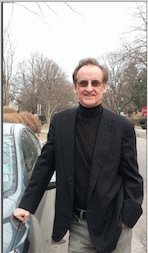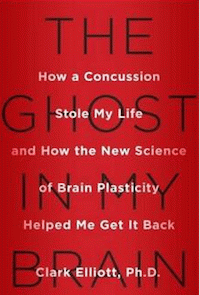Interview with Clark Elliott, author of The Ghost in My Brain: How a Concussion Stole My Life and How the New Science of Brain Plasticity Helped Me Get It Back
This is part two of my interview with Clark Elliott, who suffered a debilitating concussion and defied medical predictions by recovering fully ten years later. (Part one)
Welcome back for the conclusion of my interview with Clark Elliott, DePaul professor and author of The Ghost in My Brain: How a Concussion Stole My Life and How the New Science of Brain Plasticity Helped Me Get it Back [Viking Press, June, 2015].
JB: Clark, you were able to recover because you ran into two exceptional women, Donalee Markus and Deborah Zelinsky. Can you tell us how that came about and in what ways they were able to help you get your life back?
CE: I was at the point where my life was going to completely unravel. I read a marvelous book by Norman Doidge, M.D., called The Brain that Changes Itself, and as a result began one last search for help using the term "brain plasticity." I was lucky and chanced upon Donalee Markus, Ph.D. a cognitive restructuring specialist, who also sent me immediately to her colleague, Deborah Zelinsky, an optometrist who emphasizes neurodevelopmental rehabilitation techniques in her practice.
In Dr. Zelinsky's office, over the course of two hours, I went through exhaustive neuro-optometric testing. The result: Dr. Z knew what was wrong with me, and she knew how to fix it. I was stunned. Until Donalee, who had a plan about how to proceed, no one had ever even called me back-- there was nothing they could do. Until Dr. Zelinsky, no one even came close to the having a clue about how to fix me. But she was right: she and Donalee DID know how to set my brain back in order.
Dr. Zelinsky gave me a special prescription for eyeglasses that angled the light to different parts of my retinas, and in this way found healthy pathways through which the incoming retinal signals could travel. She routed the signals away from the damaged parts of my brain. In this way, she created something we might metaphorically think of as a dirt road through this healthy brain tissue. Dr. Markus--Donalee--gave me long sets of paper and pencil puzzle exercises that started quite simply, but built up to very sophisticated problems that exercised these newly awakened parts of my brain to teach me how use them to be human once again: how to feel and think and see relationships in the world. She turned the dirt road into a superhighway once again, that allowed me to think like a professor once more.
The part where truth is in this case more marvelous than fiction is that the bulk of this phenomenal transition back to being a real human being again took place over the course of the first three weeks of my treatment. The brain is a sublime device, well able to reconfigure itself if we can sometimes just jump start it in the right direction. At the end of that first month, I was about 70 percent restored, and after six months with the puzzles and a couple of years with the glasses, I was fully recovered in all ways.
JB: Your recovery must have seemed like a miracle, after all those years and all those medical nay-sayers. At what point did you decide to write the book and how did that go? You mentioned your copious notes. But I don't have to tell you that there's a huge difference between pages of notes and a completed, coherent manuscript.
CE: Yes, it's true that for many years I was told I would never recover, but I took the notes of my experience anyway. The experience was so peculiar in so many ways, and gave me an unusual view of how the brain and body operate together, and also how they operate in the world. Because the "meta-cognitive voice" in my head was still observing everything in real time, even when my cognition and sensory appraisals were running in slow motion, I was able to see many details of how we think, and how parts of our cognition relate to other parts, in ways that were revealing. So I guess it was just my professor's curiosity, and my decades-long habit of taking notes on anything relevant to my AI work that prompted me to capture the details of my experience.
It was not always easy. I wrote when I could and where I could, and trusted that as long as the details were accurate and I had the dates and times, I'd be able to reconstruct the narrative later if I wanted to. Some of the time that I was writing these notes--especially in the early months--I could not read. I stuffed notes files in any directory available on any computer I had at hand because I was incapable of any sort of organizational tasks. I had envelopes with scraps of paper stuffed in them all over the house, and in my office.
I knew I could write because I had already authored what turned out to be a 400,000 word novel on a challenge from my daughter to have us take part in National Novel Writing Month (NanoWriMo) together. And" I WAS THE ONE WHO GOT BETTER. So I felt it was an obligation to share both the details of the experience, exactly as they occurred, and also the details of my surprising recovery and some of the science behind why I got better after all that time. I thought there was a chance my story could make a difference for others, and for the scientific record. I am getting mail from all over the world now on both counts, so my intuition turned out to be correct.
I sorted the hundreds of vignettes into electronic piles. I then made hundreds of passes through the collected pieces of the story, combining, rewriting (for clarity only), sorting. Approaching the task like a true computer scientist, I created a complex indexing scheme using cognitive category, narrative sequence and thematic importance, among other keys, so that each of the passages had a comprehensive set of links to numerous other passages at the top. Then I began work on the manuscript as an actual book, developing the arc of how to combine the story with the science.
I was slowed at times because, to be honest, there were episodes that were extremely difficult for me to revisit--episodes of how people took advantage of my weakness during this period, and which I did not include in the book itself. I really was often quite helpless. When faced with the horror of the carefully recorded details of some of these events, it was emotionally just too difficult for me to work.
(Note: You can view every article as one long page if you sign up as an Advocate Member, or higher).







